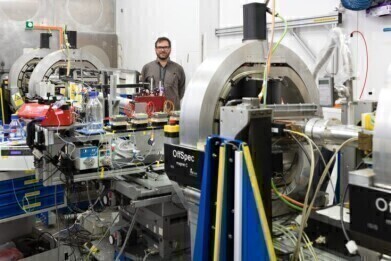-
 Credit: STFC ISIS Neutron and Muon Source
Credit: STFC ISIS Neutron and Muon Source
News & Views
Early Stage Apoptosis Mechanisms revealed
Jun 21 2023
Researchers led by Dr Luke Clifton at the Science and Technology Facilities Council (STFC) ISIS Neutron and Muon Source (ISIS) in Oxfordshire and including partners from the University of Umea and European Spallation Source in Sweden, have been able to characterise the molecular mechanism of the early stages of programmed cell death (apoptosis) a process which plays a crucial role in the prevention of cancer.
Apoptosis is regulated in normal cells by two proteins with opposing roles; the Bax protein clears old or diseased cells by perforating the cell mitochondrial membrane to form pores that trigger cell death.
This can be offset by Bcl-2, which embedded within the mitochondrial membrane, acts to prevent untimely cell death by capturing and sequestering Bax proteins. In cancerous cells however, the survival protein Bcl-2 is overproduced, leading to uninhibited cell proliferation.
To gain further insights, the team used the neutron reflectometry capability of the advanced ISIS Surf and Offspec instruments, enabling them to study in real time how BAX interacts with lipids in the mitochondrial membrane.
They discovered that when Bax creates pores in the membrane, it extracts lipids to form clusters on the mitochondrial surface via a two-stage process:
- Fast adsorption of Bax on the mitochondrial membrane surface.
- Simultaneous formation of membrane-destroying pores and Bax-lipid clusters.
This is the first time that scientists have found direct evidence of the involvement of mitochondrial lipids during membrane perturbing in cell-death initiated by Bax.
The finding builds on previous studies by the team on the molecular mechanism of membrane-bound Bcl-2 to inform a full understanding of the early stages of apoptosis.
Dr Clifton, STFC ISIS scientist and lead author, explains: “This work has relevance not only to our understanding of fundamental mammalian cell processes but to our understanding of cancer cells. In order to develop effective cancer treatments, we need to characterise every step of the process by which cancerous cells spread so that we can identify opportunities to intervene in this process.
“This research has provided another piece of the jigsaw and has moved us one step closer to tackling cancer before it takes hold. It also really shows the capabilities of neutron reflectometry in structural studies on membrane biochemistry.
Professor Gerhard Gröbner, University of Umeå and co-lead author said: “The unique findings here will not only have a significant impact in the field of apoptosis research but will also open gateways for exploring Bax and its relatives as interesting targets in cancer therapy such as by tuning up their cell-killing potential.”
Continued research is already planned at ISIS to probe this mechanism further in the hope of revealing insights into potential targets for pharmaceuticals.
Published in Science Advances
More information online
Digital Edition
ILM 49.5 July
July 2024
Chromatography Articles - Understanding PFAS: Analysis and Implications Mass Spectrometry & Spectroscopy Articles - MS detection of Alzheimer’s blood-based biomarkers LIMS - Essent...
View all digital editions
Events
Jul 28 2024 San Diego, CA USA
Jul 30 2024 Jakarta, Indonesia
Jul 31 2024 Chengdu, China
ACS National Meeting - Fall 2024
Aug 18 2024 Denver, CO, USA
Aug 25 2024 Copenhagen, Denmark

.jpg)

24_06.jpg)













